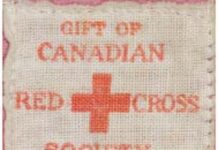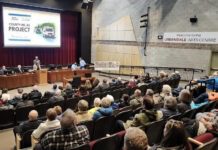This year, the Salvation Army marks 130 years in North Grenville. This is the first in a number of articles celebrating the remarkable history of that presence in the community, a presence that has led to so much good and blessing for the people of the area.
January, 1888 was a remarkable month in the history of North Grenville. It marked the arrival in the community of the Salvation Army, at the time still a revivalist group, dedicated to preaching the Gospel and seeing the people saved and sanctified. Those today who think they know the Salvation Army would have got quite a shock in 1888 to see this small group of young men and women marching through the centre of Kemptville, playing loud music, singing loud songs, and dressed in a distinctly military style manner that marked them out from everyone else around them.
On Saturday, January 14, Adjutant Marshall Joshua Spooner and three young men left Ottawa to begin a planned campaign in Kemptville that was to launch a new congregation, or “corps” of the Army in North Grenville. They had arranged with the Village Council to hire the Town Hall for a few days, but when they got off the train from Ottawa, they found that the local Methodist congregation had already taken over the Town Hall, and the Army were without a venue for their crusade. This was by no means an attempt by the Methodists to keep the Army out of Kemptville. In fact, the Methodists had a great deal in common with the Army, and were to prove true friends of the new enterprise. But in January, 1888, the Methodists had their own troubles to contend with.
After the Army had booked the Town Hall, but before they could arrive, the Methodist Church building was burned down by an angry mob of North Grenville citizens. It seems the Methodists were at the forefront of an attempt to bring prohibition to North Grenville. In 1878, the Ontario Government had passed a Bill, called the Scott Bill after its main proponent, allowing local municipalities to introduce bye-laws banning the sale of alcohol in their own jurisdiction. Temperance organisations were quite active in Ontario in those days, and the Methodists were strong supporters of the Scott Bill. The Kemptville Village Council must have been trying to pass the necessary bye-law, judging from the rather violent response of the local citizens as expressed in the destruction of the Methodist Church building. The details are hard to come by, as, at the time, there was no local newspaper in North Grenville. The Kemptville Advance seems to have ceased publication between around 1881 and 1891, so no newspaper reports of these events have been found as yet.
The fact remained that the newly-arrived Salvation Army had nowhere to meet, nor to lay their heads. Since this gave them something else in common with Jesus, they decided to follow his example further, as Spooner remarked: “So we had to follow our leader. Not to be beat, we made friends with the publicans and leased a large billiard room for one year”. In fact, it was an old store that had once been a billiard hall, which they rented from a local hotel-keeper. In spite of the set-back with the Town Hall, and the late hour by the time the hall was found, Spooner did not waste any more time. That very evening, the Army started the work in Kemptville. Spooner recorded the event briefly: “It was then about five o’clock, so we threw off our coats and went to work, and took the counters out, got a stove up, and got some lumber and fixed up some seats; borrowed some lamps, and out we go for a march, had an open air. The whole town was astir; the crowd followed us to the hall and crowded the building. We had a good time, considering, of course, they had never seen the Army before”.
A large group of Army members arrived from Brockville that night, and remained in Kemptville for the next couple of days, as more open air meetings were held on Sunday morning, afternoon and evening. Each meeting retired to the Hall, and so great were the crowds that the landlord, the hotel-keeper, ended up acting as doorman (or bouncer). Still, although the meetings were full, and the marches were followed by large crowds, there were no souls saved, until Monday night seven people came forward in the evening meeting and knelt at the Penitent Bench. Earlier that day, the Army had acquired lumber from Ambrose Clothier’s mill with which they made extra seats, and a platform to hold about twenty Soldiers. The seats were supported on soap boxes. Spooner noticed that a number of Methodists were at the Sunday evening meeting. He was told that the Methodist Minister had encouraged his flock to attend the Army meetings, after their own was finished, and help the newcomers in any way they could. He told them “if they could catch any [Holy Spirit] fire to catch it and bring it with them, and if they could leave any to do so”. Even the local Reeve and Magistrate offered the Army any help they needed.
By Wednesday morning, the work had been properly launched, and Spooner and the men from Ottawa and Brockville left Kemptville in the willing hands of Captain Grace McKenna and Lieutenant Hannah McMullen. The meetings would continue through the years, and the “outpost” of Oxford Mills would be added to the work within a few weeks of the Army’s arrival in Kemptville. The fruit of those first meetings would be seen too, as the years passed. One young man who attended the very first meeting, Harry Banks, would drop by after school and help build a permanent home for the Army Corps on Water Street. He would become an officer of the Army and for the rest of his more than 100 years would work at preaching the Gospel in Canada and the United States. And to the end of his days, he loved telling people about the winter day in 1888 that the first strange and energetic people in uniform came marching through Kemptville with their loud music and joyful noise.








